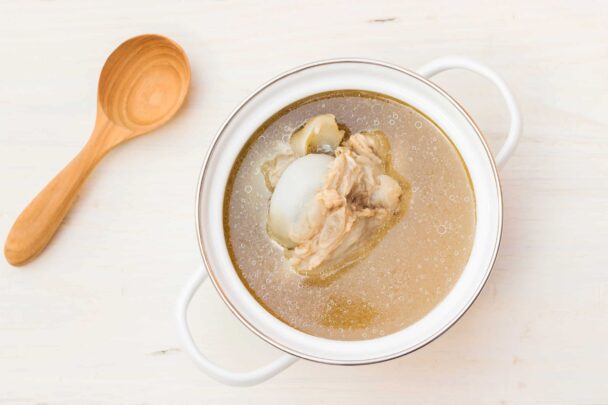Amazing Healthy Benefits of Bone Broth for Dogs
Bone broth is a superfood for dogs. The rich broth contains collagen and other nutrients extracted from bones during the cooking process. Bone broth can support your dog’s joints, digestion, immune function, allergies and recovery from surgery or illness.
What is Bone Broth?
Bone broth is made from simmering the bones (and sometimes attached ligaments, tendons, meat) of chicken, turkey, beef, fish or pork for an extended period of time. An acid like apple cider vinegar draws out important minerals, collagen, protein, vitamins and amino acids from the bones into a super healthy broth that is a little thicker than soup and very nutritious for dogs.
What Nutrients are in Bone Broth?

Bone broth typically contains amino acids, protein, fat, minerals and other nutrients essential to good health.
Amino Acids
Amino acids are vital molecules that form protein and synthesize hormones and neurotransmitters. Dogs need these amino acids for essential body functions such as:
- Muscle growth and repair
- Building collagen for joints
- Regulating inflammation
- Regenerating cells
- Wound healing
- Immunity
- Repairing the digestive tract
- Regulating insulin and blood sugar
- Heart, eye and brain health – including mood
Some amino acids such as arginine and glutamine are essential and must be provided through diet. Others like glycine, proline and lysine are typically produced in a dog’s liver. However, in periods of stress or chronic disease, dogs may need supplementation of these joint-supporting amino acids. Fortunately, bone broth is a good source of many of these amino acids.
Minerals
Minerals are vital for a dog’s metabolism, bones and cartilage, heart functioning, thyroid health and as antioxidants to prevent cancer.
Bone broth typically contains these minerals:
- Calcium
- Iron
- Magnesium
- Potassium
- Zinc
Glycoaminoglycans (GAGs)
Although technically a carbohydrate, GAGs help maintain ligaments, tendons and cartilage by making synovial fluid to keep joints lubricated and moving well. The GAGs found in bone broth include chondroitin, glucosamine and hyaluronic acid.
Fat
Dogs need healthy fats for shiny hair and fur, energy, nerve function and healthy cell membranes. Bone broth contains both saturated (heat-stable) and unsaturated (more fragile) fats. During the cooking process, saturated fats can become oxidized from the lengthy exposure to oxygen, lowering the nutritional value, becoming rancid and potentially contributing to long term health problems like cancer. If you’ve ever noticed that processed kibble begins to smell rancid a few weeks after opening a bag of dog “food”, or your dog begins to turn up his nose to it when he’s always eaten the same brand, you are seeing oxidation in action. Dry, processed kibble is sprayed with taste-enhancing fats to entice dogs to eat it, but these fats quickly become rancid with oxidation.
Oxidation isn’t a reason to avoid bone broth though, just take these steps to prevent oxidized fat in bone broth:
- Skim and discard excess fat off the top of the broth either while simmering, or when cooled and the fat is slightly hardened
- Use animal sources with higher saturated (stable) fats such as beef and lamb
How Can Bone Broth Help with Pain?
A common source of pain in dogs is related to poor joint health, including dysplasia, osteoarthritis, ligament or tendon injury. Bone broth contains nutrients that can prevent joint deterioration, help repair soft tissues around joints, keep joints lubricated and regulate inflammation.
For extra help with pain, try this all-natural homemade CBD Dog Treat with medicinal herbs.
What’s the Best Types of Bone Broth for Dogs?
Of the 22 essential and non-essential amino acids needed for health, bone broth has between 54-82% of these, although there is some variation depending on the type of bone broth. Bone broth can be made from almost any clean, organic source of animal bones, however the most commonly studied are beef, chicken and turkey.
Which Type of Bone Broth is Better for Dogs: Chicken, Turkey or Beef?
Although there are some nutritional and energetic differences among chicken, turkey and beef bone broth, all are good choices unless there are allergies or food sensitivities.
Turkey, Chicken and Beef Bone Broth Have Different Levels of Amino Acids
A study comparing 18 amino acids present in chicken, turkey and beef broth determined that:
- turkey bone broth has the highest concentration of arginine and glutamine
- beef bone broth contains the highest amount of lysine
- chicken bone broth contains the highest levels of proline and glycine.
Beef, Chicken and Turkey as Neutral or Warm Foods
Food qualities as described in Traditional Chinese Medicine can be a consideration when deciding which animal bones to use in broth. Certain conditions and doggy constitutions do better with warm, neutral or cooling meats.
For example, beef, pork and salmon are considered neutral proteins and good for most dogs, whereas chicken and turkey can be warming and might be a better choice for dogs who have cold noses, seek heat or have “cool” conditions like arthritis that is worsened by cold weather.
Dogs with “warm” conditions, who seek cool spots or have inflammation and allergies might do better with bone broths made from cooling meats like rabbit, whitefish and duck.
What are the Benefits of Bone Broth for Dogs?

This superfood can have a positive impact on many aspects of your dog’s health, especially when included as part of a Holistic Treatment Plan. To book a virtual consultation and Holistic Treatment Plan for your dog, click here.
Bone broth can play a role in helping to:
- reduce allergies and food sensitivities
- prevent hot spots
- reduce inflammation and joint pain
- prevent or regulate autoimmune diseases
- reduce anxiety and depression.
Bone Broth Can Heal and Protect your Dog’s Gut and Immune System
A poor diet (like processed kibble), over-vaccination or long periods of stress can irritate and damage the gut, leading to tiny micro-lesions, making the lining more permeable or “leaky”. Since the gut barrier is one of the first lines of defence of the immune system, damage to this barrier can allow food particles to leak through the gut into the bloodstream, triggering an immune response. Signs of leaky gut and micro-lesions might include:
- gas
- bloating
- food sensitivities
- allergies
- skin infections (hot spots)
- brittle hair and nails
- autoimmune diseases
- anxiety
Healthy dogs make essential amino acids in the right amounts. However, during periods of physical or emotional stress, the body may not produce enough, making it essential to obtain them from the diet. Bone broth is an excellent source of those amino acids such as glutamine and proline.
Bone Broth Can Reduce Inflammation and Improve Digestion
The gelatin that is formed in bone broth helps dogs digest other foods that are part of a complete and balanced diet. By improving digestion and protecting the gut lining, unhelpful inflammation can be reduced, allowing essential nutrients to be better absorbed. When medicinal herbs and vegetables are added as part of our recipes, the healing properties of bone broth are given an extra boost.
Bone Broth Can Keep Joints Healthy
Collagen is essential for healthy ligaments, tendons and joints. What many pet parents don’t realize is that the bone degradation seen in arthritis typically begins very early when a poor diet begins breaking down essential tissues supporting joints. Bone broth is an excellent source of collagen, which contains joint protecting glycosaminoglycans like glucosamine. It’s also full of chondroitin and hyaluronic acid, which are often supplemented in dogs with late stages of arthritis and poor joint health.
Bone Broth May Help Anxiety and Nervous System Disorders in Dogs
Although this is an early area for research with dogs, recent human studies have examined the effect of chicken bone broth on the nervous system in trauma-induced migraine headaches. One study found that chicken broth de-sensitized trigeminal neurons that are implicated in migraines. It is possible that dogs could gain some relief with nerve pain through pain-relieving properties of bone broth. Additionally, the amino acid glycine found in bone broth is known to promote sleep and relaxation, making this a potential benefit for nervous or anxious dogs.
Have an anxious dog? Consider making these lavender dog biscuits, or booking a Reiki session.
Bone Broth Can Help Your Dog Detoxify
Just like us, our dogs detoxify their bodies from the multitude of chemicals, unhealthy food and environmental toxins that surround us.
Their liver plays a vital role in the detoxification of:
- Household products. Dogs spend much of their days laying on the floor, so always use safe, natural floor cleaning products and avoid synthetic scented products like carpet deodorizers. Only use non-scented laundry products on dog beds or blankets.
- Pesticides. Whenever your dog walks on grass sprayed with pesticides, his liver has to work harder to detoxify the chemicals that enter through his paws, mouth and nose. Don’t use pesticides on your lawns and avoid walking on grass sprayed with chemicals.
- Processed food. Unless you are consistently feeding your dog organic, whole foods, he is being exposed to toxic ingredients and by-products – no matter how good you think that processed dog “food” may be. Avoid processed food and aim for the best quality whole, fresh food you can afford to reduce the stress on his liver.
- Antibiotics, dewormers, over-vaccination, flea and tick preventives and other medications. Although occasional use of pharmaceuticals can be necessary in serious or high-risk situations, these synthetic chemicals flood your dog’s body with toxins that need to be detoxified by the liver. Consider natural solutions wherever possible, including flea and tick prevention.
- Soap and shampoos. Many shampoos have chemicals and synthetic fragrances that might make your dog smell great, but are likely contributing to a toxic build-up in his body. Make sure you use the best shampoo for your dog to reduce the toxic load on his liver.
The liver needs amino acids like glycine to detoxify. Bone broth is rich in glycine, so if you’re thinking about making some for your favourite Fur Soul, try our easy Classic Bone Broth Recipe for Dogs and support his ability to detoxify.
How Do I Feed My Dog Bone Broth?
Some dogs love cooled or room temperature bone broth on its own. Others prefer it poured over their meals.
Give your dog about 1 ounce (1-2 tbsp) of bone broth for every 10 lbs of your dog’s weight. If he is ill or has a poor appetite, it’s ok to offer more of this nutritious broth.
Can I Give Bone Broth to Sick Dogs?
Dogs who are recovering from surgery, chemotherapy or illness may benefit from nutritious bone broth, as they recover and resume solid food.
Bone broth can also be helpful for dogs with a poor appetite, senior dogs or underweight dogs. Remember, bone broth is like chicken soup when you have a cold!
Can I Give Bone Broth to Puppies?
Yes. Bone broth can be a healthful supplement for puppies, particularly those who may be transitioning to a different diet, are underweight or recovering from vaccinations.
Is Store-Bought Chicken Soup the Same as Bone Broth for my Dog?
No. Commercially made chicken soup is usually loaded with sodium and spices and often includes pasta or rice that are unnecessary for dogs. Most processed soups use animals from confined animal feeding operations (CAFO) that are higher in toxic run-off chemicals and heavy metals. Unlike chicken soup, bone broth is simmered over 24 hours to draw nutrients out of the bones, so it’s the healthier choice for dogs.
Is Bone Broth Powder as Good as Home-Made Bone Broth for my Dog?
If you can’t prepare your own bone broth from organic, pasture-raised bones, powdered bone broth is a good option. Look for bone broth powders made from organic sources. Prepare it according to directions and give your dog the same amount as you would with a home made brew.
Another option is frozen, prepared bone broth often found in the freezer section of grocery and natural health food stores.
Can I Give Boiled Bones to My Dog?
No. Although boiling does make bones brittle and crumbly, there is still a risk for small and large bone fragments to get caught in a dog’s throat and cause injury. Strain bone broth so no bones remain. If you want to give your dog a bone for chewing, stick to large, raw bones (like beef or steak bones) and always supervise him.
The Bottom Line About Bone Broth for Dogs
Bone broth contains healthy nutrients that can support joint health, digestion, immunity and a strong gut barrier. It can also be helpful nutritional supplement for dogs with a poor appetite, senior dogs or for those recovering from surgery, illness or treatments.
Bone broth is not a complete meal and doesn’t replace a good old raw chewing bone either. However, making bone broth from your leftover organic, pasture-raised bones is a nutritious and economical way to give your dog all the benefits of this superfood.
Be kind to every living being. Respect the earth we share.
References
Shaw, M. & N. Flynn. (2019). Amino acid content of beef, chicken and turkey bone broth. Journal of Undergraduate Chemistry Research. 18(4), 15-17.
Shaw, G., Lee-Barthel, A., Ross, M. L., Wang, B., & Baar, K. (2017). Vitamin C-enriched gelatin supplementation before intermittent activity augments collagen synthesis. The American journal of clinical nutrition, 105(1), 136–143.
Longhurst, A. (2018) Understanding and Managing Chronic Inflammation. https://www.healthline.com/health/chronic-inflammation







